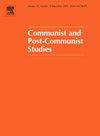Countering the “Sweep Effect”
IF 1.3
4区 社会学
Q3 INTERNATIONAL RELATIONS
引用次数: 1
Abstract
One of the well-known properties of multimember plurality systems is their propensity toward producing the so-called “sweep effect,” manifesting itself in that the strongest party in a majority of districts sees its full slate of candidates elected even if the margin of plurality is small. Despite this property, and mostly for technical reasons, this system remains rather widely employed for conducting local elections both in democracies and in electoral authoritarian regimes. This article employs the evidence from the 2019 municipal elections in St. Petersburg to examine how increased strategic coordination of opposition voters became instrumental in countering the sweep effect and thus reducing the scope of political monopoly in an overtly authoritarian context. The analysis shows that this goal was achieved primarily by enabling opposition-minded voters to cast a greater number of votes than it otherwise would have been.对抗“扫频效应”
多成员多数制的一个众所周知的特点是,他们倾向于产生所谓的“横扫效应”,这表现在大多数地区最强大的政党看到其全部候选人当选,即使多数票的差距很小。尽管有这种性质,而且主要是出于技术原因,但在民主国家和选举独裁政权中,这种制度仍然被广泛用于进行地方选举。本文利用2019年圣彼得堡市选举的证据,研究反对派选民加强战略协调是如何在对抗横扫效应方面发挥作用的,从而在公开独裁的背景下缩小政治垄断的范围。分析表明,这一目标的实现主要是通过使持反对意见的选民能够投出比其他情况下更多的选票。
本文章由计算机程序翻译,如有差异,请以英文原文为准。
求助全文
约1分钟内获得全文
求助全文
来源期刊

Communist and Post-Communist Studies
Multiple-
CiteScore
1.90
自引率
0.00%
发文量
23
期刊介绍:
Communist and Post-Communist Studies is an international journal covering all communist and post-communist states and communist movements, including both their domestic policies and their international relations. It is focused on the analysis of historical as well as current developments in the communist and post-communist world, including ideology, economy and society. It also aims to provide comparative foci on a given subject by inviting comments of a comparative character from scholars specializing in the same subject matter but in different countries.
 求助内容:
求助内容: 应助结果提醒方式:
应助结果提醒方式:


